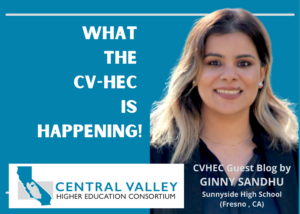WHAT THE CV-HEC IS HAPPENING GUEST BLOG (JAN. 2023): Master’s Upskilling
This month’s What The CV-HEC Is Happening guest blog is presented by Ginny Sandhu, an English teacher at Sunnyside High School in Fresno who earned a master’s degree in December, 2021 through CVHEC’s Master’s Upskilling Program. She earned her bachelor’s degree at Fresno State in 2008 (credential 2009) and has been teaching for 13 years. Here Ginny shares the value of the upskilling program and how it will benefit not just her personal and professional advancement but also her students through dual enrollment.
Master’s Upskilling Program leads to
dual enrollment courses; student benefit
BY GINNY SANDHU
Sunnyside High School – Fresno CA
My latest academic journey – obtaining my Master of Arts last summer – officially began at National University in January 2021. But as I reflect on the years past, it really started long before that.
 Having taught writing-centered courses like AP Language and Composition and Expository Reading and Writing for many years positioned me perfectly to want to improve my art for a very important reason — my students.
Having taught writing-centered courses like AP Language and Composition and Expository Reading and Writing for many years positioned me perfectly to want to improve my art for a very important reason — my students.
I wanted to pursue a graduate program that helped me become a better writing instructor for students who take high stakes courses like the AP courses I taught. So much of who I was (am) as a professional at the time aligned so well with the courses offered in the program (Master’s of English, specialization in Rhetoric) that once I learned about the opportunity, I happily enrolled immediately.
From the start, the program had many entities that were involved to make the initiative a success for its candidates — the Central Valley Higher Education Consortium, Fresno Unified School District, Fresno County Office of Education and National University — all supported this enormous effort to help individuals like me achieve academic goals without any financial burden.
Once the courses began, I was assigned a wonderful mentor from Fresno City College, a tenured professor, who supported me with various facets of the program. Some of the concerns he assisted me with were academic while others were career-related. I was able to get feedback on major essays and projects and, any time I felt like I was reaching a point of burnout, his wisdom, knowledge, and experience guided me accordingly.
In my courses, I learned about ancient and modern rhetoric. In one class, I was able to develop a revision method using various research-based approaches that we studied in class.
In another class, we delved into education and technology and how the world of writing is changing because of all the technology that is conveniently available to a modern-day student. We even took a course on Noir as a genre and learned about Film Noir and Femme Fatales. Romanticism came close to being one of my favorite courses, but History of Rhetoric took the trophy for being one of the most informative and enjoyable courses for me. I appreciated learning more about Emerson who believed in the importance of receptivity as we interact with the world, with nature, and believed in the complete submission to the sublime experience as a way to a spiritual clearing.
But it was the History of Rhetoric course that took us through the most beautiful journey starting first with the Greeks then the Romans, and onwards to more modern rhetoricians. The course allowed us to see how rhetoric has expanded over the centuries to include broader concerns of epistemology, social construction, ideology and the study and use of symbol systems. It also allowed me to see the power of language and the many facets of rhetoric as an art form. I came to understand the hegemonic power of political structures in creating metanarratives through language that strive for homogenization of people—thereby reducing people to a single story. This led me to study Plato, Cicero, Quintilian, Lyotard, Nietzsche, Goddard, Said, Sartre, Hegel, Freud, and numerous other philosophers who have shed light on the power structures that are constructed through language.
The most gratifying moment in the program for me was my Capstone project in which I rhetorically analyzed Frantz Fanon’s Black Skin, White Masks. While the labor was long and arduous, I felt well-supported by the faculty in charge and the two months allotted to just writing my thesis.
My hope was to understand how language as a power tool operates in our world and Fanon’s psychoanalytic approach to racism and his characterization of psychic violence through his radical stance against established scholarship allowed me to see that it is indeed possible to challenge oppressive systems and language gives you that ability. Personally, this program gave me the tools to deconstruct language around racial conflicts, such as the ones in Punjab, and the Black Lives Matter movement in the United States.
Currently, I am teaching Dual Enrollment English 1A at Sunnyside High School in Fresno. Like the master’s program, I was fortunate to have been assigned a mentor again, and lucky for me, I got to work with the same mentor as my MA program: I gladly call Jeff Tannen a friend now.
I will forever be grateful for the opportunity to get a master’s degree with so much support built around me — and all of this without any financial investment of my own and entirely online, allowing me the flexibility I needed to sustain a full-time teaching position and be there for my family.




Leave a Reply
Want to join the discussion?Feel free to contribute!